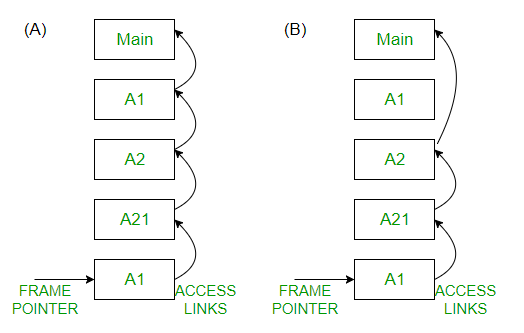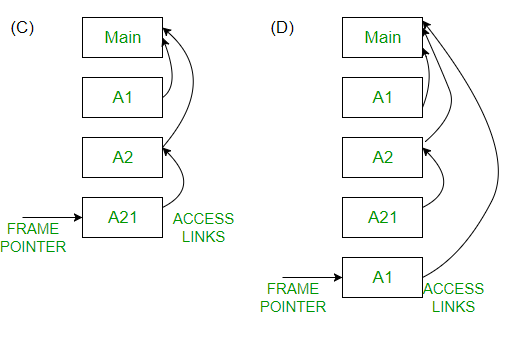Principles of Programming Languages
Question 1
Consider the program given below, in a block-structured pseudo-language with lexical scoping and nesting of procedures permitted.


Program main;
Var ...
Procedure A1;
Var ...
Call A2;
End A1
Procedure A2;
Var ...
Procedure A21;
Var ...
Call A1;
End A21
Call A21;
End A21
Call A1;
End main.
Consider the calling chain : Main->A1->A2->A21->A1
The correct set of activation records along with their access links is given by :


Question 3
Which of the following are true?
I. A programming language which does not permit global variables of any
kind and has no nesting of procedures/functions, but permits recursion
can be implemented with static storage allocation
II. Multi-level access link (or display) arrangement is needed to arrange
activation records only if the programming language being implemented
has nesting of procedures/functions
III. Recursion in programming languages cannot be implemented with dynamic
storage allocation
IV. Nesting of procedures/functions and recursion require a dynamic heap
allocation scheme and cannot be implemented with a stack-based allocation
scheme for activation records
V. Programming languages which permit a function to return a function as its
result cannot be implemented with a stack-based storage allocation scheme
for activation records
Question 5
Which of the following statements are CORRECT?
1) Static allocation of all data areas by a compiler makes it impossible to implement recursion. 2) Automatic garbage collection is essential to implement recursion. 3) Dynamic allocation of activation records is essential to implement recursion. 4) Both heap and stack are essential to implement recursion.
Question 6
Consider the following code written in a pass-by-reference language like FORTRAN and these statements about the code.
subroutine swap(ix,iy)
it = ix
L1 : ix = iy
L2 : iy = it
end
ia = 3
ib = 8
call swap (ia, 1b+5)
print *, ia, ib
end
S1: The compiler will generate code to allocate a temporary nameless cell, initialize it to 13, and pass the address of the cell swap
S2: On execution the code will generate a runtime error on line L1
S3: On execution the code will generate a runtime error on line L2
S4: The program will print 13 and 8
S5: The program will print 13 and -2
Exactly the following set of statement(s) is correct:
Question 9
Choose the best matching between the programming styles in Group 1 and their characteristics in Group 2.
| Group-1 | Group-2 | ||
| P. | Functional | 1. | Command-based, proce-dural |
| Q. | Logic | 2. | Imperative, abstract data type |
| R. | Object-oriented | 3. | Side-effect free, declarative, expression evaluation |
| S. | Imperative | 4. | Declarative, clausal representation, theorem proving |
There are 35 questions to complete.
Last Updated :
Take a part in the ongoing discussion
